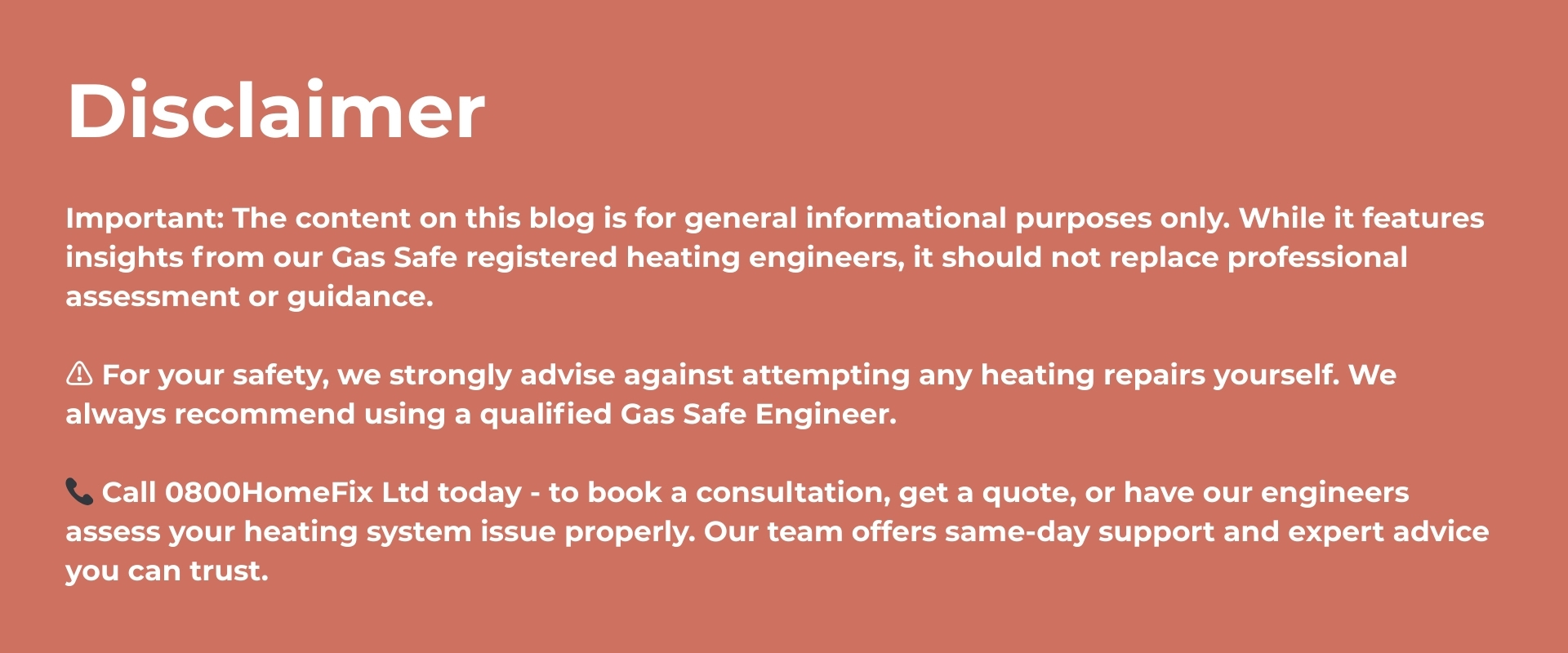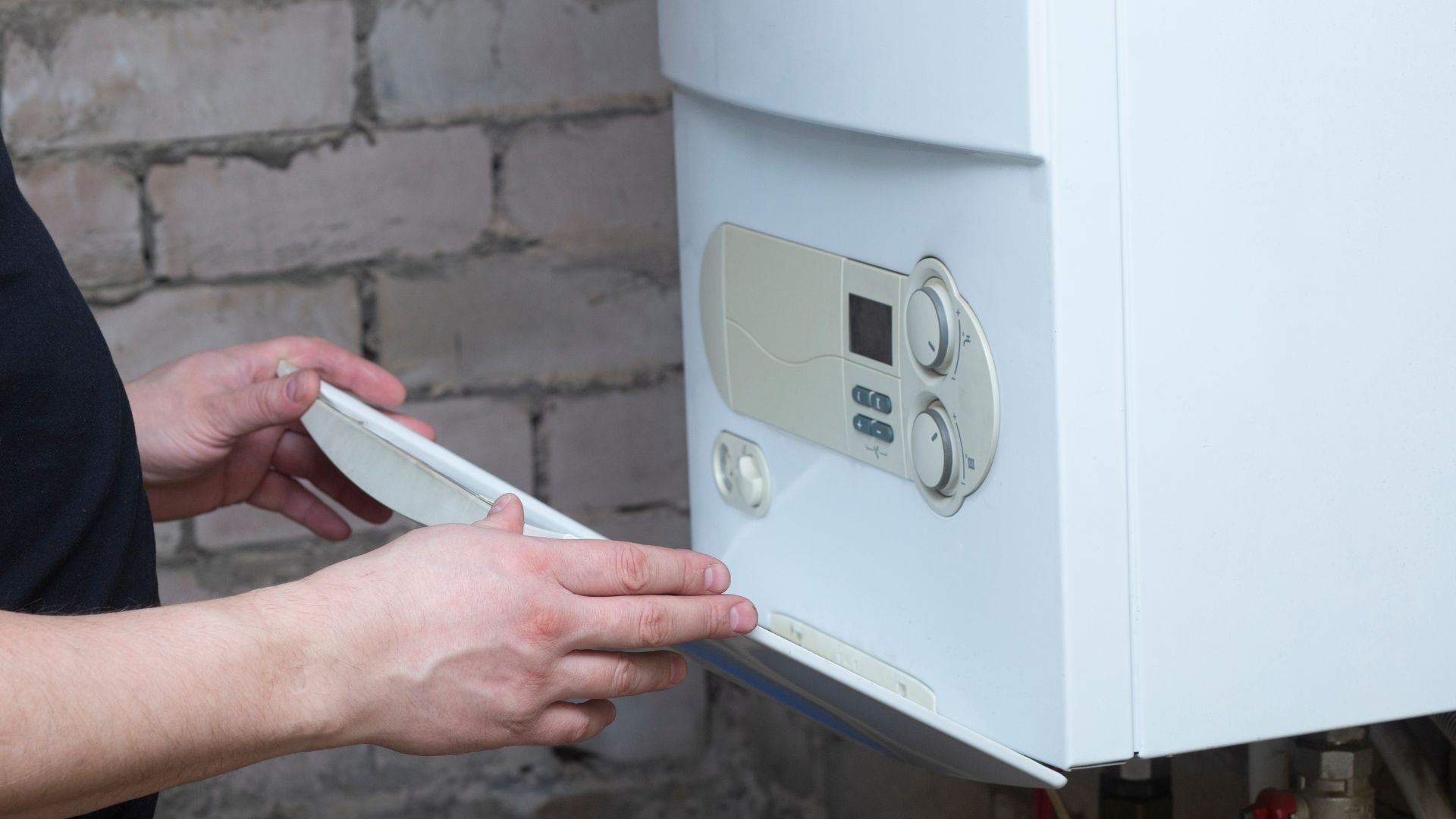

When your boiler is working properly, it quietly provides you with reliable hot water and heating. But when it starts to overheat, it can be a sign of a serious problem. Boiler overheating is not only inconvenient, it can also be dangerous if not dealt with quickly. At 0800 Homefix, we’ve handled hundreds of overheating boiler cases across London, from older systems struggling in the winter months to newer models affected by pressure issues or component failures.
Before any work is carried out on your gas boiler, always check your engineer’s Gas Safe ID to ensure they are qualified and compliant with safety regulations.
In this guide, we’ll walk you through everything you need to know about boiler overheating: why it happens, how to spot the signs early, and what you can do to fix or prevent it.
What Is Boiler Overheating?
Boiler overheating occurs when the boiler gets too hot internally, usually due to a fault in its ability to regulate temperature or pressure. As a safety mechanism, most modern boilers will lock out and shut down automatically if they detect an unsafe rise in temperature. Modern boilers are equipped with built-in safety features and essential boiler components designed to prevent overheating.
Ignoring an overheating boiler can lead to damaged components, boiler failure, or, in extreme cases, even risk of fire or explosion. Internal components can be particularly vulnerable to damage if overheating is not addressed promptly. That’s why identifying and addressing the problem quickly is critical.
Common Signs Your Boiler Is Overheating
Watch for these red flags:
- Boiler constantly turning off and on (short cycling)
- Unusual banging or kettling noises (kettling can sound like a kettle’s whistle)
- Strange noises from the boiler or radiators, which may indicate blockages or air in the system
- Uneven heating in radiators, such as cold spots or inconsistent warmth, which can signal circulation issues
- Burning smells from the boiler cupboard
- Error codes on the display (e.g., Baxi E121, Ideal L1, Worcester C6)
- Radiators getting too hot too quickly
- Pressure gauge above 2.5 bar
- Boiler casing feels excessively hot
- Visible leaks or drips from the pressure relief valve (this may indicate a faulty pressure release valve)
If you notice any of the above, shut off your boiler and call a qualified engineer from 0800 Homefix right away.
Causes of Boiler Overheating
Understanding what causes a boiler to overheat helps you respond more effectively. Below are the most common culprits:
Issues within the boiler system, heating system, or central heating system – such as excess pressure, increased pressure, excess air, or improper water circulation-can all contribute to overheating.
1. Limescale or Sludge Build-Up
Over time, limescale buildup, limescale accumulation, and limescale build up in the heat exchanger can restrict the flow of cooler water, leading to overheating and causing noises like kettling. In addition to limescale, other debris such as rust and sludge can accumulate in the system, contributing to blockages and creating cold spots in radiators due to uneven water circulation. Professional power flushing is an effective way to remove limescale and other debris from the heating system, restoring proper flow and efficiency. To help prevent future limescale and sludge problems, consider installing a water softener and regularly adding a central heating inhibitor to the system.
2. Pump Failure
The circulation pump, also known as the boiler’s pump or boiler pump, is responsible for moving hot water through your system. A pump fault can prevent the system from circulating water or allowing hot water to circulate freely, which may result in the water becoming overheated and potentially causing system failure. Signs of a faulty pump include banging noises or reduced heating efficiency, often due to issues like sludge or limescale buildup. In some cases, installing a new pump is necessary to restore proper water circulation and prevent overheating.
3. Thermostat or Temperature Sensor Fault
If the thermostat fails to monitor temperature correctly, the boiler may keep heating water even when it’s already hot. In many modern systems, the boiler’s thermistor is responsible for monitoring the water temperature and relaying this information to the control board. A faulty thermistor or issues with the boiler’s thermistor can prevent the system from accurately detecting the water temperature and maintaining the set temperature. This can lead to boiler struggles, such as difficulty in regulating heat, uneven heating, or fluctuating room temperatures. In some cases, the boiler may overheat or fail to provide consistent hot water, highlighting the importance of having a qualified heating engineer diagnose and replace a faulty thermistor to restore proper temperature regulation.
4. Blocked or Faulty Pressure Relief Valve
The pressure release valve is a critical safety component in your boiler system, specifically designed to release excess pressure and prevent dangerous pressure buildup. If you have a faulty pressure release valve-such as one that is stuck, leaking, or blocked-excess pressure can accumulate, leading to overheating, system failure, or even explosions. Regular inspection and maintenance of the pressure release valve are essential to ensure proper pressure release and to keep your boiler operating safely.
5. Low Water Flow
Insufficient water due to closed radiator valves, system airlocks, or frozen pipes can disrupt circulation, leading to overheating. Issues with the water supply or improper water circulation can also cause uneven heating in radiators, resulting in cold spots or inconsistent warming. Ensuring proper water circulation throughout the system is essential to prevent these problems and maintain optimal boiler performance.
6. Faulty PCB (Printed Circuit Board)
The boiler’s internal computer may misinterpret sensor data, continuing to heat unnecessarily.
Error Codes Associated with Overheating
Boiler brands often show specific codes for overheating-related faults:
- Baxi: E121, E125, E133
- Ideal: L1, F3, F4
- Worcester Bosch: C6, E9, D1
- Vaillant: F20, F22, F28
- Potterton: E130, E110
For detailed explanations of these error codes and troubleshooting steps, always consult the manufacturer’s manual.
How to Fix an Overheating Boiler
1. Switch Off the Boiler
Turn off the power and let the boiler cool completely before doing anything else.
2. Check the Pressure Gauge
If pressure is too high, bleed radiators to release excess water.
3. Bleed Your Radiators
This can remove trapped air and excess air, improving circulation and preventing overheating.
4. Inspect for Obvious Blockages or Leaks
Check around the boiler and pipes for leaks or limescale deposits.
5. Clean or Replace the Thermostat Sensor
Only a qualified professional heating engineer or a Gas Safe engineer, should clean or replace the thermostat sensor to ensure safety, compliance with legal requirements, and proper operation.
6. Flush the System
A professional power flush removes sludge and improves flow.
7. Call a Gas Safe Registered Engineer
If unsure or uncomfortable, always contact experts like 0800 Homefix. Our team of Gas Safe registered engineers, listed on the Gas Safe Register, are legally authorised to work on gas boilers and ensure all repairs and installations meet safety and compliance standards. Hiring a certified gas engineer or qualified heating engineers guarantees that issues like overheating are diagnosed and resolved safely. We also offer fixed price quotes for repairs or replacements, providing transparency and peace of mind. We handle overheating issues promptly and safely.
Preventing Boiler Overheating
Regular maintenance can dramatically reduce the chances of overheating. Here are smart steps to take:
- Schedule an annual boiler service with 0800 Homefix to keep your boiler serviced and help prevent overheating
- Install a magnetic filter to capture debris
- Use a scale reducer if you live in a hard water area
- Bleed your radiators every few months
- Check pressure monthly and top up if needed
- Set your thermostat to a moderate temperature
- Ensure adequate ventilation around your boiler
- Consider upgrading to a new boiler if your current system is outdated or prone to overheating, as a new boiler can offer improved safety features to help prevent overheating
FAQs
Can I fix an overheating boiler myself?
Some steps like bleeding radiators or checking pressure are DIY-friendly, but most fixes-especially with a gas boiler-require a professional.
Is boiler overheating dangerous?
Yes, if ignored. Overheating boilers can sometimes trigger a boiler lockout, shutting down the system to prevent further damage. In rare cases, if safety features fail, components may melt and release toxic smoke, posing serious health hazards. It can also cause fire and explosion risks.
How often should my boiler be serviced?
Annual boiler servicing, catch’s issues like overheating early and keep the system efficient.
Is it normal for a boiler to feel hot?
Warm is okay, but if the casing is too hot to touch, it’s a sign that boilers overheat, which can be dangerous if safety features fail.
How much does it cost to fix an overheating boiler?
Costs vary based on the fault and whether you need a new gas boiler or a full boiler installation. Early diagnosis and repairs by 0800 Homefix can save you from pricier problems later.
Book Your Boiler Check with 0800 Homefix
If you suspect your boiler is overheating or notice any issues with your central heating or boiler system, don’t take chances. Boiler overheats can be dangerous and may indicate underlying problems within your central heating or boiler system that require immediate attention. Our Gas Safe engineers are available for same-day service across London. Whether you need diagnostics, repairs, or a full boiler replacement, we ensure your home stays safe and warm by maintaining the efficiency and safety of your central heating system.
Call us or book online today for trusted, local boiler support, repairs or maintenance.

